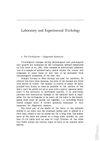 2 citations,
January 1980 in “Acupuncture & electro-therapeutics research”
2 citations,
January 1980 in “Acupuncture & electro-therapeutics research” Hair loss might be due to nerve issues, treatable with electric stimulation or acupuncture.
 1 citations,
February 2023 in “Digestive diseases and sciences”
1 citations,
February 2023 in “Digestive diseases and sciences” Gastroparesis may cause hair loss due to micronutrient deficiencies, and multivitamins might help.
 1 citations,
January 2022 in “Journal of experimental and clinical medicine”
1 citations,
January 2022 in “Journal of experimental and clinical medicine” PCOS is linked to diabetes and insulin resistance, and managing AGEs may help treat related symptoms.

Adequate vitamin D might lower, and high hair chromium might increase DNA damage in obese women.
 1 citations,
January 2019 in “Elsevier eBooks”
1 citations,
January 2019 in “Elsevier eBooks” Electrospun matrices help regenerate skin and hair follicles using PCL and collagen scaffolds.
 1 citations,
May 2016 in “The Nurse Practitioner”
1 citations,
May 2016 in “The Nurse Practitioner” Treating PCOS is complex, involving medication like metformin and lifestyle changes, and requires attention to mental health due to high depression and anxiety rates.
 1 citations,
April 2015 in “Current problems in dermatology”
1 citations,
April 2015 in “Current problems in dermatology” The document concludes that the trichogram is a useful tool for diagnosing hair loss and suggests semi-organ cultures for practical trichological research.
 1 citations,
January 2010 in “Springer eBooks”
1 citations,
January 2010 in “Springer eBooks” Certain micronutrients may improve hair and nail health, but more research is needed to confirm their benefits.
 1 citations,
May 2009 in “Wiley-Blackwell eBooks”
1 citations,
May 2009 in “Wiley-Blackwell eBooks” Early treatment of PCOS in teens is crucial to prevent long-term health issues like diabetes and heart disease.
 1 citations,
November 2008
1 citations,
November 2008 Yonnyuniksoogobon-dan taken orally promotes hair growth by affecting growth factors in hair roots.
 1 citations,
March 1997 in “Journal of the American Pharmaceutical Association”
1 citations,
March 1997 in “Journal of the American Pharmaceutical Association” Pharmacists play a key role in helping patients use over-the-counter products correctly, including those for hair regrowth and smoking cessation.
 1 citations,
January 1996 in “Springer eBooks”
1 citations,
January 1996 in “Springer eBooks” Diet affects baldness; eat balanced, less animal fat, more fruits, vegetables, and cereals.
 July 2024 in “Biological and Pharmaceutical Bulletin”
July 2024 in “Biological and Pharmaceutical Bulletin” Licorice extract helps hair growth and may treat hair loss.
 June 2024 in “International journal of nanomedicine”
June 2024 in “International journal of nanomedicine” Azelaic acid micro/nanocrystals, especially with ultrasound and salicylic acid, greatly improve acne treatment.
 March 2024 in “PLoS medicine”
March 2024 in “PLoS medicine” Physical activity, height, and smoking affect prostate cancer risk.
 February 2024 in “BioMetals”
February 2024 in “BioMetals” Heavy metals like arsenic, cadmium, and lead can increase cancer risk and worsen outcomes.
 February 2024 in “Planta”
February 2024 in “Planta” TRM21 helps control flavonoid production and root hair growth in Arabidopsis thaliana.
 December 2023 in “Annals of phytomedicine”
December 2023 in “Annals of phytomedicine” Dutasteride is more effective than finasteride for hair loss treatment.
 October 2023 in “Biomedical science and engineering”
October 2023 in “Biomedical science and engineering” Innovative methods are reducing animal testing and improving biomedical research.
 August 2023 in “Natural Resources for Human Health”
August 2023 in “Natural Resources for Human Health” Vegetarians should take B vitamin supplements to avoid health issues.
 August 2023 in “Dermatology reports”
August 2023 in “Dermatology reports” A baby with maple syrup urine disease improved from skin problems by adjusting his diet to correct amino acid levels.
 February 2023 in “Journal of clinical medicine research”
February 2023 in “Journal of clinical medicine research” Zinc acetate hydrate may help reduce fatigue and hair loss in post-COVID-19 patients.
 August 2022 in “Deleted Journal”
August 2022 in “Deleted Journal” Nutritional education reduces chemotherapy side effects and improves health in breast cancer patients.
 January 2022 in “Journal of Skin and Stem Cell”
January 2022 in “Journal of Skin and Stem Cell” Trichodynia is a painful scalp condition needing targeted treatments beyond symptom management.
 January 2021 in “Middle East journal of applied sciences”
January 2021 in “Middle East journal of applied sciences” Zinc is essential for plant growth and human health, but many soils lack enough zinc, affecting crops and potentially leading to health problems.
 September 2020 in “Journal of Investigative Medicine”
September 2020 in “Journal of Investigative Medicine” Omics techniques are needed to understand the scalp microbiome's role in alopecia areata for new treatments.

Changes in skin bacteria can affect hair loss and new treatments targeting these bacteria may prevent balding without sexual side effects.
 January 2019 in “Springer eBooks”
January 2019 in “Springer eBooks” Transplanting skin cells is a safe, effective, and affordable treatment for vitiligo.
 June 2018 in “Acta Scientiae Veterinariae”
June 2018 in “Acta Scientiae Veterinariae” Tailored treatment plans are crucial for managing canine dermatomyositis-like disease.
 December 2017 in “The journal of investigative dermatology. Symposium proceedings/The Journal of investigative dermatology symposium proceedings”
December 2017 in “The journal of investigative dermatology. Symposium proceedings/The Journal of investigative dermatology symposium proceedings” The summit aimed to speed up finding treatments for alopecia areata.






























